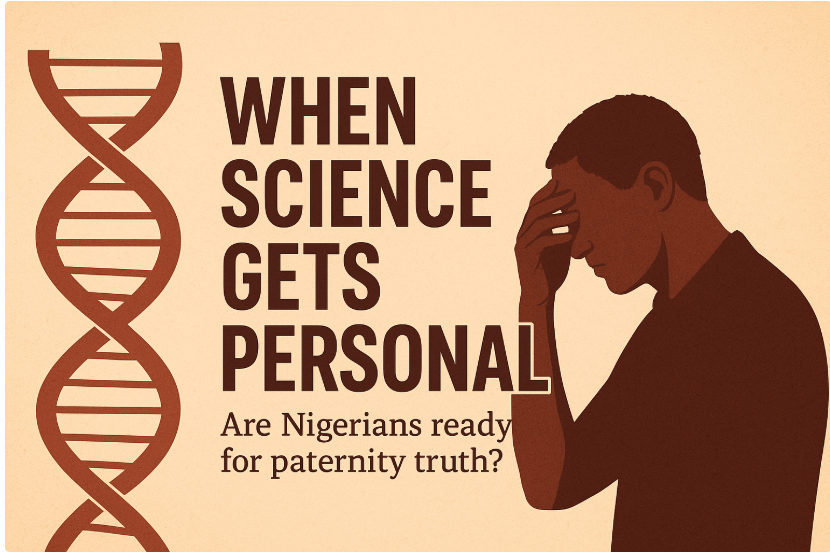I just stumbled on a statistic that feels both surreal and deeply, deeply human. According to the 2025 Annual DNA Testing Report by Smart DNA Nigeria, a whopping 1 in every 4 paternity tests came back negative, meaning the presumed father and biological dad weren’t the same person. I blinked a few times, I’m talking double-take level. Then I thought: this isn't just a number, it's a window into stories of trust, secrets, and evolving families in our own backyard.
Imagine hearing that your brother, friend,or yes, even you, might be grappling with that kind of whisper in their life. I paused. The scientific voice feels steady. DNA isn’t opinion, it’s proof. Parentage testing uses DNA profiles with probabilities up to 99.99% to affirm or exclude a biological bond. Yet beneath that number lies a wild tapestry: love, doubt, heartbreak, reconciliation, and sometimes relief. Just picture someone with years of paternal devotion being told, hold up, science says otherwise. Chilling. Powerful. And deeply human.
What really made me stop and think were the trends buried within that stat. Firstborn sons, you know, the lion-tailed princes of our families, account for 64% of the negative results. That means almost two-thirds of the time, the big man in the house isn’t biologically related. Cue record scratch. I mean, culturally, firstborn sons carry the family name, inheritance, lineage, and legacy. For them to be overrepresented in this paternity discrepancy category, it’s not just numbers, it's narrative. A revelation. A punch to the ego, maybe a cultural jolt so sharp, it forces a national conversation.

Then there’s the “Japa effect”, the DNA testing boom tied to Nigerians emigrating, seeking a second passport or global mobility. Immigration-related tests surged to 13.1% of total requests. Suddenly DNA becomes not just truth-telling, but opportunity-securing. For many families, knowing who you are biologically is now just as vital as having the right documents to travel. It’s transformation in real time.
So here I am, notebook in one hand, heart in the other, trying to untangle it all. I catch myself thinking: what would I do if those were my odds? Let’s say one of my very own future kids came out with a DNA test, and boom, not my biological child. How would I react? What emotions would rush in? betrayal? Relief? Loss? It’s a psychological time bomb. And the data shows we’re far from alone in this. Men initiate 88% of all tests, especially aged 41 and above. Many of these fathers have built legacies and support structures around their kids. Imagine that only to discover the foundation wasn’t biological after all.
What makes the story even more pressing is that Nigeria currently lacks legal protections around paternity fraud, unlike, say, South Africa. So these men find out, sometimes after years, and there’s no legal recourse. It’s emotional, financial, and deeply lonely. No insurance policy for your broken heart or your dissociated bank account.
But friends, it's not just doom and complexity. There's hope and action baked into this story, too. Smart DNA and experts like Elizabeth Digia are calling for policy reform, integration of DNA testing into family health services, and public education campaigns to dismantle myths like “physical resemblance equals paternity”. Imagine a future where premarital counseling includes a DNA option, where healthcare support structures provide emotional counseling alongside testing, and where society treats this as common sense, not taboo.
This is where science meets empathy and policy becomes poetry. Because DNA’s power isn’t just in its double helices, it’s in realignments of trust, in rebuilding relationships, in redirecting public health. It’s a call to normalize tough conversations, to build legal bridges, to wrap every test result, expected or not, in compassionate care.
I’ll leave with this thought: that statistic, 1 in 4, isn’t abstract. It’s personal. It’s a mirror to our vulnerabilities. It reminds us that modern science can be stunning, unsettling, even healing, but only if we meet it with wisdom, empathy, and actionable change.
Here’s to the day when truth and tenderness live hand in hand, and where every baby, mother, presumed father, and actual father feel seen, heard, and supported through whatever DNA reveals.
Posted Using INLEO